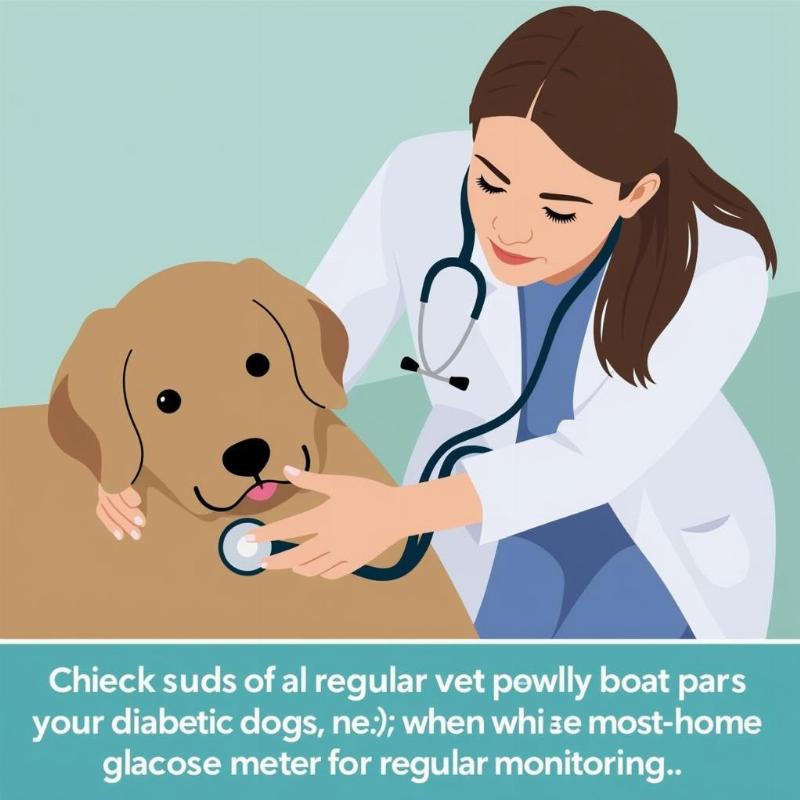Using a human glucose meter to check your dog’s blood sugar can be a helpful tool for managing diabetes at home, but it’s important to understand that the readings you get won’t be exactly the same as what your vet would obtain with their specialized equipment. This article will explore the reasons behind the discrepancy and provide valuable information on how to interpret these readings, ensuring your furry friend receives the best possible care. We’ll also discuss when it’s crucial to consult with your veterinarian, emphasizing the importance of their professional expertise in managing your dog’s diabetes.
Understanding the Differences Between Human and Veterinary Glucose Meters
Why the difference in readings? Human glucose meters are calibrated for human blood, which has different properties than canine blood. Dog blood has a higher packed cell volume (PCV), meaning it has a higher concentration of red blood cells compared to plasma. This difference can affect how the glucose meter interacts with the blood sample, leading to variations in the readings. Simply put, a human meter may underestimate the actual glucose level in your dog’s blood.
Interpreting Human Glucose Meter Readings for Dogs
While a human glucose meter can provide a general idea of your dog’s blood glucose levels, it’s essential to interpret these readings cautiously. It’s best to establish a baseline with your vet. They can compare readings from your home meter with their in-house lab equipment, helping you understand the typical difference between the two for your dog. This personalized approach is key, as the variation can differ from dog to dog.
When to Consult Your Veterinarian
Regular monitoring with a human glucose meter can be part of your dog’s diabetes management plan, but it should never replace regular veterinary check-ups. Any sudden changes in glucose readings, whether high or low, warrant immediate veterinary attention. Similarly, if your dog displays any symptoms associated with diabetes (increased thirst, frequent urination, lethargy, weight loss, etc.), contact your veterinarian immediately, even if the glucose readings appear normal on your home meter.
 Khám sức khỏe bệnh tiểu đường cho chó
Khám sức khỏe bệnh tiểu đường cho chó
Keeping Your Diabetic Dog Healthy and Happy
Managing canine diabetes involves more than just monitoring blood glucose. A holistic approach includes a carefully regulated diet, regular exercise, and close collaboration with your veterinarian. Your vet can help you create a tailored plan that addresses your dog’s individual needs and ensures they live a long, healthy, and happy life.
FAQ
- Can I use any human glucose meter for my dog? While most human meters can be used, it’s best to discuss the most appropriate type with your veterinarian.
- How often should I check my dog’s glucose at home? Your veterinarian will recommend a monitoring schedule based on your dog’s specific needs.
- What should I do if my dog’s glucose reading is very high or very low? Contact your veterinarian immediately.
- Are there specific dog glucose meters available? Yes, but they are often more expensive. Your veterinarian can advise on whether a dedicated dog meter is necessary.
- Can diet and exercise affect my dog’s glucose levels? Absolutely. Both play a crucial role in managing diabetes.
- Is there a way to convert human glucose meter readings to dog readings? Not directly. A baseline comparison with your vet’s readings is necessary.
- Are there any potential dangers in using a human glucose meter for my dog? The primary risk is misinterpreting readings. Always consult your vet.
Beautdogs.us: Your Trusted Partner in Dog Care
Beautdogs.us is your premier online destination for comprehensive and reliable dog care information. We offer expert advice on everything from breed-specific care to nutrition, training, and health. Whether you’re a new dog owner or a seasoned pro, Beautdogs.us provides the resources you need to ensure your furry friend receives the best possible care. Contact us today at [email protected] or +1 501-555-7529 for personalized guidance.